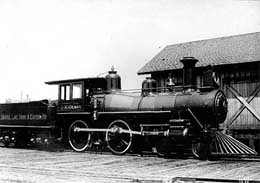 At the age of fourteen—on December 5, 1884—Frank Boreham came home with the news that the office of the High Brooms Brick Company was wanting the services of a boy.
At the age of fourteen—on December 5, 1884—Frank Boreham came home with the news that the office of the High Brooms Brick Company was wanting the services of a boy.After a sleepless night Frank and his father walked from their Tunbridge Wells home for the interview, the boy got the job and he started right away.
It was an office job but whenever a train pulled out of the siding, Frank had to hurry down to check the number of trucks of bricks as they left the works.
All went well for a year. Then came that fateful Saturday morning. Frank went to the siding and began recording his entries in his book. Where the siding joined the main line, the points were operated by a pair of levers at the side of the track. Here the guard was standing, hands on lever, ready to throw the points as the train shunted off the siding.
But the junior clerk’s absent-mindedness, for which he had become so notorious at school, had not yet left him, for although he had long known of the danger, he stood directly in front of the second lever hard by the track.
As the engine slowly drew across the points, the movement of the rails flung the lever behind Frank’s back suddenly forward, hurling him under the grinding wheels of the locomotive. The wonder was not that he was so badly smashed, but that he was lifted out alive.
He was hospitalised and his right leg (just below the knee) was amputated. Septicaemia set in as well as other complications. Upon his departure from hospital months later Frank Boreham had to get about on crutches. Later he had a number of artificial legs made for him and he walked with a limp. His son, Frank, said that growing up as a boy and teenager he never knew his father had an artificial leg for it had never stopped his father from being such a great walker. In Boreham’s diaries in the 1950s there are entries about the pain in his legs (due to the primitive surgery in 1885) which caused many sleepless nights.
F W Boreham did not return to the Brick Company but as he had learned Pitman’s Shorthand in hospital he had a short career working as a journalist for the local Advertiser and the Kent and Sussex Courier.
Geoff Pound
Sources: T Howard Crago, The Story of F W Boreham, 24-25; F W Boreham's Unpublished Diaries.
Image: An 1885 locomotive


